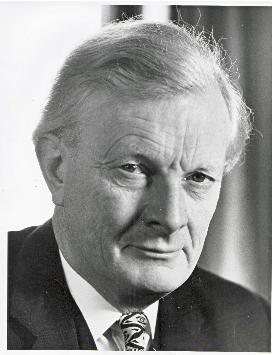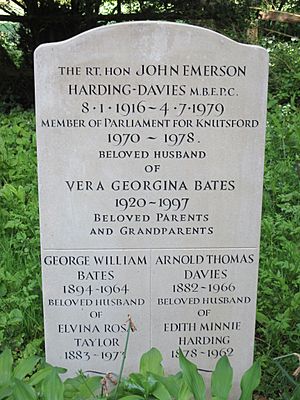John Davies (British businessman) facts for kids
Quick facts for kids
John Davies
|
|
|---|---|

Davies in 1973
|
|
| Shadow Foreign Secretary | |
| In office 11 April 1976 – 6 November 1978 |
|
| Leader | Margaret Thatcher |
| Preceded by | Reginald Maudling |
| Succeeded by | Francis Pym |
| Chancellor of the Duchy of Lancaster | |
| In office 5 November 1972 – 5 March 1974 |
|
| Prime Minister | Ted Heath |
| Preceded by | Geoffrey Rippon |
| Succeeded by | Harold Lever |
| President of the Board of Trade | |
| In office 15 October 1970 – 5 November 1972 |
|
| Prime Minister | Ted Heath |
| Preceded by | Michael Noble |
| Succeeded by | Peter Walker |
| Secretary of State for Trade & Industry | |
| In office 15 October 1970 – 5 November 1972 |
|
| Prime Minister | Ted Heath |
| Preceded by | Post established |
| Succeeded by | Peter Walker |
| Minister of Technology | |
| In office 28 July 1970 – 15 October 1970 |
|
| Prime Minister | Ted Heath |
| Preceded by | Geoffrey Rippon |
| Succeeded by | Position abolished |
| Director of the Confederation of British Industry | |
| In office 30 July 1965 – 15 October 1969 |
|
| Preceded by | Position established |
| Succeeded by | Campbell Adamson |
| Member of Parliament for Knutsford |
|
| In office 18 June 1970 – 6 November 1978 |
|
| Preceded by | Walter Bromley-Davenport |
| Succeeded by | Jock Bruce-Gardyne |
| Personal details | |
| Born |
John Emerson Harding Harding-Davies
8 January 1916 London, England |
| Died | 4 July 1979 (aged 63) London, England |
| Political party | Conservative |
| Spouse |
Vera Bates
(m. 1943) |
| Children | 2, including Frank |
| Education | St Edward's School, Oxford |
| Profession | Businessman |
John Emerson Harding Harding-Davies (8 January 1916 – 4 July 1979) was an important British businessman and politician. He was known for leading the Confederation of British Industry (CBI) in the 1960s. Later, he joined politics and became a key member of Prime Minister Edward Heath's government. He held several important roles, including the first Secretary of State for Trade and Industry.
Contents
Early Life and Education
John Davies was born in Blackheath, London, on 8 January 1916. His father was an accountant from Folkestone. John went to Windlesham House School and then St Edward's School, Oxford.
He followed his father's path and became an accountant. In 1939, he became the youngest Chartered accountant in the country. Soon after, World War II began, and he joined the Royal Army Service Corps. He spent most of the war working in Combined Operations headquarters. After the war, he received an honour called the MBE in 1946.
In 1943, John Davies married Vera Georgina Bates. They had two children, a daughter named Rosamond Ann and a son named Francis, also known as Frank.
Career in Business
After the war, Davies started working as an accountant for the Anglo-Persian Oil Company. This company later changed its name to British Petroleum (BP) in 1954. He worked for BP in London, Stockholm, and Paris. By 1956, he was promoted to General Manager for BP's markets.
In 1961, Davies became the Vice-Chairman and Managing Director of Shell-Mex & BP. This made him the youngest person to hold this position. In this role, he was in charge of many petrol stations across the country. He also became a director at a company called Hill Samuel.
Leading the CBI
In 1965, three big business groups merged to form the Confederation of British Industry (CBI). John Davies was chosen to be its Director-General. He wanted the CBI to be a strong voice for British businesses. He supported ideas like the National Economic Development Council, where the government, businesses, and trade unions could discuss the economy together.
Davies also strongly supported Britain joining the European Community. He believed it would be good for the country's economy. As the CBI chief, he was part of several important councils, including the British Productivity Council.
He was a Conservative at heart. After the value of the Pound sterling dropped in 1967, he became more critical of the government. He often spoke on television about his concerns. In 1969, he left his role as Director-General of the CBI.
Political Career
In October 1970, John Davies became the first Secretary of State for Trade and Industry. This was a new government department created by Prime Minister Edward Heath. Davies believed that the government should not interfere too much with businesses. He famously said that the country should focus on people who are "not 'lame ducks'," meaning those who can look after themselves.
However, his ideas were tested when Rolls-Royce, a very important company, faced financial problems in 1971. The government decided to help the company to prevent it from going bankrupt.
Later, in June 1971, a shipbuilding company called Upper Clyde Shipbuilders also faced problems. The government initially refused to give it a loan. The workers at the shipyard decided to continue working and occupy the yard. This action showed that the workers were committed. In February 1972, the government changed its mind and decided to save three of the four shipyards.
Working with Europe
In November 1972, Davies became the Chancellor of the Duchy of Lancaster. His main job was to manage Britain's relationship with the European Community. Britain officially joined the European Community on 1 January 1973. Davies worked mostly behind the scenes to make sure British laws matched European laws.
In Opposition
After Edward Heath's government left office in 1974, John Davies remained a Member of Parliament. He did not join the main opposition team right away. Instead, he became the chairman of a committee that looked closely at new laws coming from the European Community. He gained a good reputation for his detailed work.
In 1975, Davies actively supported Britain staying in the European Community during a public vote called a referendum. In 1976, Margaret Thatcher, the new leader of the Conservative Party, appointed him as the Shadow Foreign Secretary. This meant he was the main spokesperson for foreign affairs for the opposition party.
Davies did not always agree with all of Thatcher's economic ideas, but he did share her concerns about the Soviet Union. He also believed that international rules should be kept against the government of Rhodesia (now Zimbabwe) because he felt they were not working towards peace.
Illness and Passing
In 1978, John Davies was diagnosed with a serious illness. He quickly stepped down from his political roles in the Shadow Cabinet and Parliament. He passed away on 4 July 1979.
Before he died, he was going to be given a special title called a life peerage, which would have made him Baron Harding-Davies. However, he died before the official paperwork was completed. To honour him, Queen Elizabeth II later granted his wife, Vera Georgina, the title of Lady Harding-Davies. His children were also given the rank of children of a life peer.


